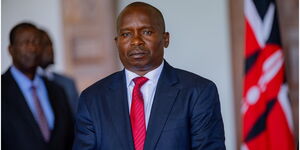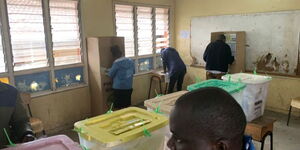President William Ruto has outlined the government's plan to address the outstanding National Health Insurance Fund (NHIF) debt, which has adversely affected the rollout of the new Social Health Authority.
The President confirmed on Wednesday, March 5, that the government owed debts amounting to Ksh33 billion by the time the NHIF became defunct on November 22, 2024, adding that there was an elaborate plan to settle all the debts.
"The accumulated debt has significantly impacted healthcare facilities, limiting their ability to provide essential services to Kenyans," the President noted in his statement.
In a decisive move, Ruto announced that the government had resolved to settle all outstanding claims of the health facilities contracted by NHIF whose claims amounted to Ksh10 billion or less.
These facilities, according to the president, constituted 91 per cent of the total hospitals that were owed by the government.
"The remaining 9 per cent, with claims of over Ksh10 million, will be subjected to a verification exercise which should be completed within 90 days," Ruto's said adding that Cabinet Secretary for Health Deborah Barasa will be tasked to gazette the verification committee within a week.
Under the newly established Social Health Authority (SHA), Ruto further clarified that current claims would continue to be settled within a month, stating that since the October 1, 2024 rollout, SHA had already disbursed KSh 18.2 billion to cover all undisputed claims lodged up to January 31, 2025.
Ruto's directives come at a time when the Social Health Authority faces a myriad of challenges, which mainly revolve around funding crises.
On Tuesday, a report from Auditor General Nancy Gathungu's report exposed a worrying trend - that 2.5 per cent of member contributions to SHA were being deducted and deposited into an escrow account that lacked transparency and proper oversight.
Uncompetitive procurement processes, a lack of payment agreements, and unfavourable contract clauses were also found to be some of the key challenges facing the new healthcare system.
In February, Rural and Urban Private Hospitals Association (RUPHA) Chairperson Brian Lishenga also faulted the government for allegedly attempting to solve the debt crisis by bagging on Kenyans' SHA contributions, insisting the best way to sort the debt crisis was through a supplementary budget.
Amid the president's reaffirmation of the government’s commitment to addressing challenges facing SHA, Treasury Cabinet Secretary John Mbadi also appeared before the Senate on Wednesday where he revealed there were allocations to support SHA, Primary Healthcare, and Critical Healthcare in the supplementary budget.












